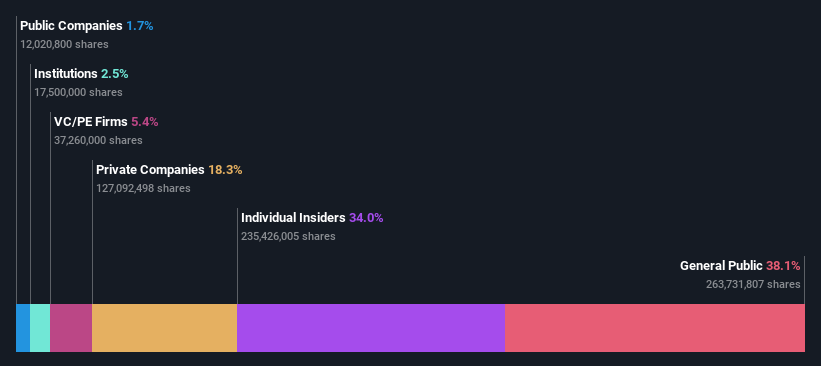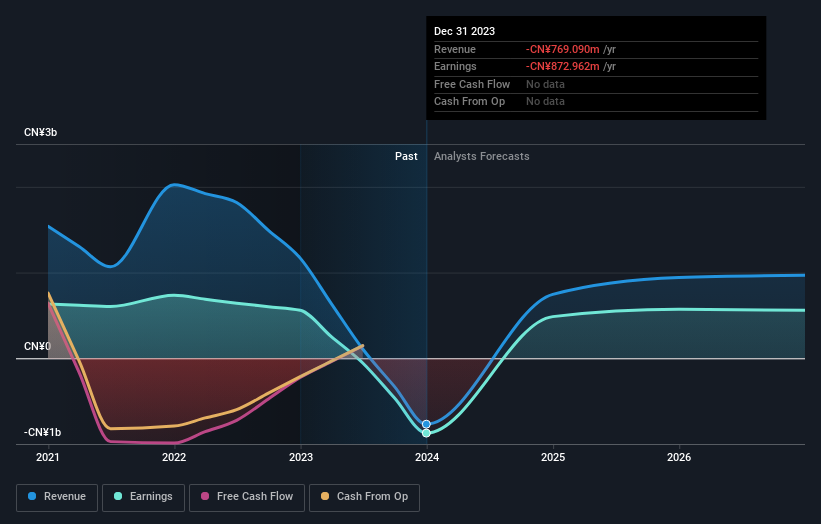Stock Analysis
- Hong Kong
- /
- Capital Markets
- /
- SEHK:1973
Tian Tu Capital Co., Ltd.'s (HKG:1973) 22% gain last week benefited both individual investors who own 38% as well as insiders

Key Insights
- Tian Tu Capital's significant individual investors ownership suggests that the key decisions are influenced by shareholders from the larger public
- The top 5 shareholders own 51% of the company
- Insider ownership in Tian Tu Capital is 34%
A look at the shareholders of Tian Tu Capital Co., Ltd. (HKG:1973) can tell us which group is most powerful. With 38% stake, individual investors possess the maximum shares in the company. That is, the group stands to benefit the most if the stock rises (or lose the most if there is a downturn).
While individual investors were the group that benefitted the most from last week’s HK$485m market cap gain, insiders too had a 34% share in those profits.
In the chart below, we zoom in on the different ownership groups of Tian Tu Capital.
Check out our latest analysis for Tian Tu Capital

What Does The Institutional Ownership Tell Us About Tian Tu Capital?
Institutions typically measure themselves against a benchmark when reporting to their own investors, so they often become more enthusiastic about a stock once it's included in a major index. We would expect most companies to have some institutions on the register, especially if they are growing.
Institutions have a very small stake in Tian Tu Capital. That indicates that the company is on the radar of some funds, but it isn't particularly popular with professional investors at the moment. If the company is growing earnings, that may indicate that it is just beginning to catch the attention of these deep-pocketed investors. It is not uncommon to see a big share price rise if multiple institutional investors are trying to buy into a stock at the same time. So check out the historic earnings trajectory, below, but keep in mind it's the future that counts most.

Tian Tu Capital is not owned by hedge funds. From our data, we infer that the largest shareholder is Yonghua Wang (who also holds the title of Top Key Executive) with 30% of shares outstanding. Its usually considered a good sign when insiders own a significant number of shares in the company, and in this case, we're glad to see a company insider play the role of a key stakeholder. With 11% and 5.4% of the shares outstanding respectively, Shenzhen Paladin Nine Capital Management Partnership Enterprise (Limited Partnership) and Shenzhen Futian Guide Fund Investment Co., Ltd. are the second and third largest shareholders. Furthermore, CEO Weidong Feng is the owner of 1.0% of the company's shares.
On looking further, we found that 51% of the shares are owned by the top 5 shareholders. In other words, these shareholders have a meaningful say in the decisions of the company.
Researching institutional ownership is a good way to gauge and filter a stock's expected performance. The same can be achieved by studying analyst sentiments. While there is some analyst coverage, the company is probably not widely covered. So it could gain more attention, down the track.
Insider Ownership Of Tian Tu Capital
The definition of an insider can differ slightly between different countries, but members of the board of directors always count. Company management run the business, but the CEO will answer to the board, even if he or she is a member of it.
Insider ownership is positive when it signals leadership are thinking like the true owners of the company. However, high insider ownership can also give immense power to a small group within the company. This can be negative in some circumstances.
Our most recent data indicates that insiders own a reasonable proportion of Tian Tu Capital Co., Ltd.. It has a market capitalization of just HK$2.1b, and insiders have HK$718m worth of shares in their own names. It is great to see insiders so invested in the business. It might be worth checking if those insiders have been buying recently.
General Public Ownership
With a 38% ownership, the general public, mostly comprising of individual investors, have some degree of sway over Tian Tu Capital. While this group can't necessarily call the shots, it can certainly have a real influence on how the company is run.
Private Equity Ownership
With an ownership of 5.4%, private equity firms are in a position to play a role in shaping corporate strategy with a focus on value creation. Some might like this, because private equity are sometimes activists who hold management accountable. But other times, private equity is selling out, having taking the company public.
Private Company Ownership
We can see that Private Companies own 18%, of the shares on issue. Private companies may be related parties. Sometimes insiders have an interest in a public company through a holding in a private company, rather than in their own capacity as an individual. While it's hard to draw any broad stroke conclusions, it is worth noting as an area for further research.
Next Steps:
It's always worth thinking about the different groups who own shares in a company. But to understand Tian Tu Capital better, we need to consider many other factors. Take risks for example - Tian Tu Capital has 1 warning sign we think you should be aware of.
Ultimately the future is most important. You can access this free report on analyst forecasts for the company.
NB: Figures in this article are calculated using data from the last twelve months, which refer to the 12-month period ending on the last date of the month the financial statement is dated. This may not be consistent with full year annual report figures.
Valuation is complex, but we're helping make it simple.
Find out whether Tian Tu Capital is potentially over or undervalued by checking out our comprehensive analysis, which includes fair value estimates, risks and warnings, dividends, insider transactions and financial health.
View the Free AnalysisHave feedback on this article? Concerned about the content? Get in touch with us directly. Alternatively, email editorial-team (at) simplywallst.com.
This article by Simply Wall St is general in nature. We provide commentary based on historical data and analyst forecasts only using an unbiased methodology and our articles are not intended to be financial advice. It does not constitute a recommendation to buy or sell any stock, and does not take account of your objectives, or your financial situation. We aim to bring you long-term focused analysis driven by fundamental data. Note that our analysis may not factor in the latest price-sensitive company announcements or qualitative material. Simply Wall St has no position in any stocks mentioned.

Simply Wall St
About SEHK:1973
Tian Tu Capital
Tian Tu Capital Co., Ltd. is a private equity and venture capital firm specializing in investments in small and medium sized companies in early-stage, mature, and Pre-IPO stages.
High growth potential and fair value.
